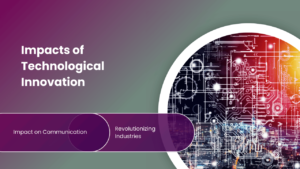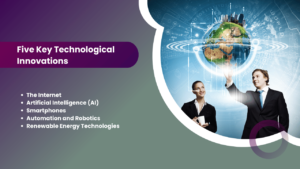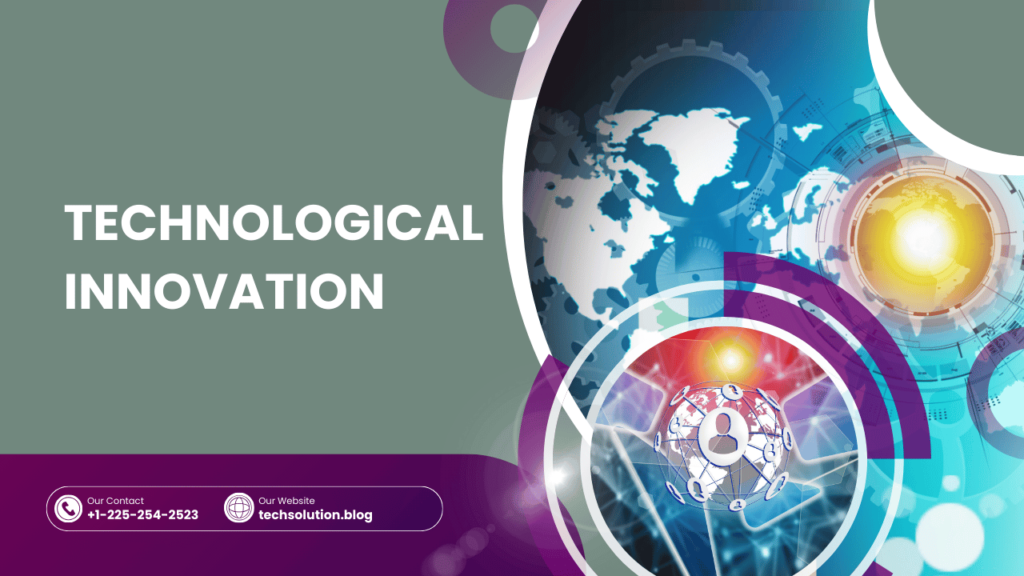Technological innovation didn’t just change the world—it redefined what was possible. From instant global communication to medical miracles, innovation has touched every corner of our lives. Consider this: over 63% of the world’s population is now online, compared to just 1% in 1995. That’s not just progress; it’s a paradigm shift.
Technology is more than gadgets and software—it’s about how we live, work, and dream bigger. For businesses, it’s been a catalyst for growth and an unavoidable challenge to adapt. For individuals, it’s transformed the way we connect and thrive. The world looks different because technology has made it possible to see things that once only existed in our imagination.
In this article, we’ll explore how technological innovation has reshaped industries, economies, and even our own perceptions of what’s achievable. Let’s dive into the fascinating journey of how technology turned today’s dreams into tomorrow’s reality.
What is Technological Innovation
Technological advancements have evolved rapidly, creating a significant impact across industries and changing the way we live. The journey began with the Industrial Revolution, paving the way for machines and automation, and has now led us to the digital age, where artificial intelligence (AI), digital transformation, and smart technologies are at the forefront. This evolution didn’t just affect one sector—it impacted communication, healthcare, business, and education, among many others.
The introduction of global connectivity through the internet was a defining moment. It brought the world closer, enabling us to communicate instantly regardless of distance. In 1995, only 1% of the world’s population was connected, but today, the internet is a fundamental part of how we work, socialize, and entertain ourselves. The shift towards digital transformation has been monumental, as businesses strive to keep up with the rapidly changing technological landscape.
Broad Impacts of Technological Innovation

Impact on Communication
Innovation in communication is one of the most significant examples of how technology has changed the world. Smartphones, social media platforms, and messaging apps have revolutionized how we interact with each other. In just a few decades, we went from waiting days for a letter to instantly sending messages across the globe. This level of global connectivity has not only enhanced personal communication but has also opened doors for international business and collaboration.
Key Impacts on Communication:
- Instant Messaging: The ability to send messages instantly has transformed both personal and professional communication.
- Social Media Platforms: Tools like Facebook, Twitter, and Instagram have changed how we share information and stay connected.
- Video Conferencing: Applications such as Zoom, Microsoft Teams, and Google Meet have made remote work and global collaboration possible.
Video conferencing technology is another example of how technological advancements have impacted communication. With tools like Zoom, Microsoft Teams, and Google Meet, remote work has become feasible, leading to increased productivity and new opportunities for businesses to collaborate without geographic constraints. These disruptive technologies have fundamentally altered how businesses operate, making remote teams and global partnerships the norm rather than the exception.
Revolutionizing Industries
Technological innovation has been a game-changer for industries worldwide. The industrial revolution 4.0, characterized by automation, smart technologies, and the integration of AI, has redefined production processes and increased efficiency. Manufacturing industries now use robotics to streamline operations, leading to cost reductions and increased productivity. For example, assembly lines once operated manually are now run by automated systems, which have reduced human error and sped up production times.
Major Changes in Industries:
Manufacturing:
- Use of robotics for automation.
- Increased productivity and reduced human error.
Healthcare:
- Advanced diagnostics and robotic surgery.
- Wearable devices that monitor health metrics in real-time.
- Growth of telemedicine, allowing remote consultations.
Education:
- Adoption of e-learning platforms and virtual classrooms.
- Accessibility to information, enabling inclusive education.
In healthcare, technology has delivered medical miracles. From advanced diagnostics to robotic surgery, technological progress has allowed doctors to save lives more efficiently and accurately. Wearable devices now monitor health metrics in real-time, providing valuable insights for both individuals and healthcare providers. Telemedicine has also become a common practice, allowing patients to consult doctors without leaving their homes—this is a direct result of the digital innovation that the healthcare sector has embraced.
Education is another area where technological advancements have had a profound impact. The traditional classroom setting has been enhanced with digital tools, online courses, and virtual classrooms. The COVID-19 pandemic accelerated the adoption of e-learning platforms, demonstrating how technology can ensure continuity even during challenging times. The accessibility of information and resources through the internet has made education more inclusive, enabling people from different backgrounds to gain knowledge and skills previously out of reach.
Five Key Technological Innovations and Their Impact

Here are five key technological innovations that have had a significant impact on the world:
1. The Internet
- The internet is perhaps the most transformative technological advancement of the modern era.
- It has changed how we access information, communicate, and conduct business.
- With over 63% of the world’s population online, the internet has become an essential tool for global connectivity and economic growth.
2. Artificial Intelligence (AI)
- AI has revolutionized multiple industries, from healthcare to finance.
- It automates routine tasks, improves decision-making, and enhances customer experiences.
- AI is shaping the future of work, with intelligent systems that can learn, adapt, and predict outcomes.
3. Smartphones
- Smartphones have brought computing power to our fingertips, enabling instant communication and access to information.
- They have transformed how we interact, socialize, work, and even shop.
- The impact of smartphones on daily life is profound, making them an indispensable part of modern living.
4. Automation and Robotics
- Automation has led to significant productivity improvements in manufacturing and other industries.
- Robotics has reduced human error and enhanced the efficiency of complex tasks.
- Automation technologies have allowed businesses to scale their operations while maintaining quality.
5. Renewable Energy Technologies
- Technological advancements in renewable energy, such as solar and wind power, have made clean energy more accessible and affordable.
- These innovations are crucial in the fight against climate change, reducing the dependency on fossil fuels.
- The shift towards renewable energy is paving the way for a sustainable future.
Economic Growth Through Technological Progress
Economic growth has been significantly influenced by technological innovation. Countries that embrace technological change are often the ones that experience the most substantial economic gains. Digital transformation has helped businesses reach new markets, operate more efficiently, and innovate faster. Automation and productivity improvements are central to economic growth, as companies can produce more goods at a lower cost, which in turn drives economic activity.
Contributions to Economic Growth:
- Digital Transformation: Helps businesses innovate and reach new markets.
- Automation: Increases productivity and reduces production costs.
- E-commerce: Allows small businesses to compete with larger corporations.
- Cloud Computing: Provides affordable technology solutions for small enterprises.
Small businesses have benefited immensely from technological advancements. E-commerce platforms, digital marketing, and cloud computing services have leveled the playing field, allowing small enterprises to compete with larger corporations. The internet has made it easier for businesses to reach customers globally, and advancements in logistics and supply chain management have made it possible to serve those customers efficiently.
Challenges of Technological Adaptation
While technological innovation has brought about numerous benefits, it has also presented challenges, particularly for businesses and individuals struggling to adapt. For companies, keeping up with the latest technologies is an ongoing challenge that requires constant investment and a willingness to evolve. Technological adaptation involves not only implementing new systems but also training employees and ensuring cybersecurity measures are in place.
Key Challenges:
- Investment: High costs involved in implementing new technologies.
- Employee Training: Continuous upskilling is needed to stay current.
- Cybersecurity: Increasing threats requiring robust protection measures.
For individuals, the rapid pace of technological change can be overwhelming. The need for digital literacy has never been more critical, as jobs increasingly require familiarity with digital tools. Automation and AI have also raised concerns about job displacement, as some roles become obsolete due to technological advancements. However, with the right training and focus on upskilling, individuals can adapt to the evolving job market and take advantage of new opportunities that technology creates.
The Societal Impact of Technology
Technological change has deeply impacted society, altering how we interact, work, and perceive the world. Social media platforms have transformed how we communicate, share experiences, and build relationships. While these platforms have fostered connection, they have also raised issues related to privacy, misinformation, and mental health. The influence of technology on society is complex—while it provides tools for growth and connection, it also requires us to navigate new ethical and social challenges.
Societal Changes:
- Social Media: Enhanced connectivity but raised privacy concerns.
- Smart Homes: Use of interconnected devices to improve convenience.
- Ethical Challenges: Issues related to data privacy, misinformation, and mental health.
Smart technology influence has led to the creation of smart homes, where devices are interconnected, providing convenience and enhancing the quality of life. Voice-activated assistants like Amazon Alexa and Google Home have made it possible to control lighting, temperature, and security systems with simple voice commands. These technological breakthroughs have made daily tasks more manageable, improving overall living standards.
Future Prospects of Technological Innovation
Looking ahead, technological innovation shows no signs of slowing down. The development of artificial intelligence, machine learning, and other disruptive technologies will continue to reshape industries and economies. AI is already playing a role in automating routine tasks, enhancing decision-making processes, and improving customer experiences across sectors.
Future Innovations to Watch:
- Artificial Intelligence: Automating tasks and improving decision-making.
- Smart Cities: Infrastructure designed to optimize efficiency and quality of life.
- Autonomous Vehicles: Revolutionizing transportation.
- Renewable Energy: Technologies to create a sustainable future.
- Biotechnology: Advancements that could revolutionize healthcare.
The potential for technological evolution is vast, and the coming years will likely bring innovations that will further blur the lines between the physical and digital worlds. The concept of smart cities, where infrastructure is designed to optimize efficiency and improve the quality of life for residents, is becoming a reality. Autonomous vehicles, renewable energy technologies, and advancements in biotechnology are just a few examples of innovations that could revolutionize our future.
However, with these advancements comes the responsibility to ensure that technology is used ethically and sustainably. Policymakers, businesses, and individuals must work together to address issues related to data privacy, cybersecurity, and the ethical use of AI. The goal should be to leverage technology to create a better world for everyone, ensuring that the benefits of innovation are distributed equitably.
Conclusion
Technological innovation has had an undeniable impact on the world, reshaping industries, economies, and even our daily lives. From revolutionizing communication and healthcare to driving economic growth and enhancing the quality of life, technology has transformed the way we experience the world. However, this transformation comes with challenges that require careful consideration and adaptation.



